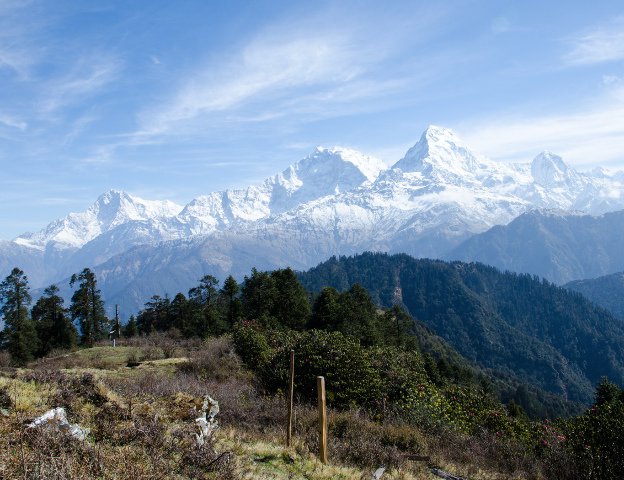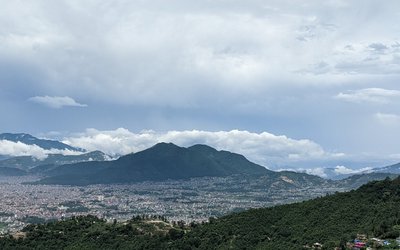
2079 BS will make an entrance with two main issues that will shape the national security environment of Nepal. The third wave of COVID-19 will disclose its implications and the nation will need to spend more vitality for arranging for the fourth wave. The three tier selection from local to federal will have to take place to outline Nepal’s contour to stability or volatility. Besides social, economic, diplomatic challenges the greatest national security threat to Nepal is political instability and institutional corruption.
Political instability is due to politicization of institutions, intra party feud, personal ambition, undemocratic practices with the internal governance of political parties and lack of transparency. Corruption is leading to institutionalization. Corruption is being directed for influencing strategies and policies, positions and appointments and clinching into power. The money earned from corruption is prevailing as a pillar for influencing elections and convincing the population, the source of national power.
Look Back at Oli’s Years in Office
In brief, the country is reaching out to find a new normal in these periods of uncertainty.
The Indo-Pacific Region is predominant well focused by the only global power the US. The immediate neighbors China and India are imminent to acquire its political space in South Asia and the Himalaya has been more vibrant. Nepal lying at the central with assess to China’s ports as well as infrastructure connectivity in the Tibetan region and the new border law has provided ample pretext for Nepal’s political elites predominantly the communists to look for an alternative diplomatic maneuvering. Nepal is no more a land locked country but is land linked, which was mentioned by President Xi during his visit to Nepal in October 2019 after 23 years. This outpours the argument that dependence with India has lessened. The institutionalization of relationship between the Chinese Communist Party and the Nepal Communist Party has decreased due to internal and external purposes but remains open to another viability. Anti-India oratory for strengthening political influence in the parliament is on the intensification with the constitutional amendments of inducting Kalapani area in the map and the haste to support the new map. These events and happenings have geostrategic bearing and geopolitical consequences.
The US development program the Millennium Challenge Cooperation Nepal compact(MCCNC)has taken a political discourse. Political leaders as well as academicians are having separate connotations on the same verse and more than that, disinformation and misinformation has trampling the perception of the people. US government approved MCCNC designed to improve the availability of electricity and increase road maintenance to advance connectivity, driven growth and to lay a strong foundation for new investment on Nepal’s request. There has been no decisive approach on US grant for development efforts showing the way that corruptionand political influence strides.
The signing of the Belt and Road Initiative in May 2017 was a catch on China’s announcement of the Qinghai-Tibet railway that could be extended to Kerung on the Nepal-China border in 2008. The strategic connectivity is observed as a game changer as well as a nationalist tool for anti-India rhetoric when Nepal solely depended on India for third country trade and transit. The Nepal-China Trans Himalayan Multi-Dimensional Connectivity Network with the 72-kilometer to the border and 170-kilometers to Kathmandu Nepal China Cross Border Railway projects is a provision with one, the funding modalities of approximately US$319 million for feasibility study and US$2.3 billion for the project when Sri Lanka’s Hambantota has been an example of a dept trap. Two, 98.5% of the railway is likely to compromise high bridges and tunnels making it technically challenging and topographically unsuitable. Third, the railway reached Shigatse in Tibet in 2014 with a plan to reach Nepal’s border which is about 500 kilometers northeast in 2020 but has been pushed back to 2025. Lastly the plan is more a political stunt with hidden agendas than a reality that Nepal is enthusiastic about when China and US rivalry in on and China and India confrontation is ongoing.
The uncommon coalition amongst the Nepali Congress (NC), a democratic party, Communist Party of Nepal (Maoists-center) NCP-MC) Communist Party of Nepal (Unified Socialist) just formed and Loktantrik Samajwadi Party Nepal is on reign with the Judiciary’s pronouncement to re-instate the parliament and appoint Sher Bahadur Deuba as the Prime Minister. The alliance paced up accusing Oli for his dictatorial behavior. The party unity amongst the left aborted contributing to political disunity creating a void has only complemented to social, cultural and governance breakdown in the near term, which the country is not primed for.
Corruption index expresses no substantive progress in corruption control ranking 117th out of 180 countries.
The nation is in a shattering status. The state of affairs of national security is vulnerable, uncertainty is taking stride, the national challenges are getting more complex and the political, economic, diplomatic, social, cultural state of affairs is ambiguous.
The last three years which was and opportunity has been missed and missed because one, India’s unclear foreign policy that was brought about by the new political environment with the 12-point agreement two, foreign political influence in Nepal’s politics and three escalations in China’s interests. The political resolve of the world powers and economic undertakings have strategic bearing in Nepal’s governance.
Foresight of Priorities
The mandate of the new electorate will have to look into a few provisions as the implications will only bring about instability.
Faulty Provisions in the Constitution
The articles of the eight-year-old and the most expensive constitution of the world isbeing debated. The ongoing row is about defining the articles of the constitution vis-à-vis the three-tier election. It is election now, as it is the medium that conveys or confiscates from power. Three articles come into discussion Article 85, 215 para 6 and 216. Article 85 spells out that the term of the House of Representative shall be five years by accepting that the House will be dissolved just a few months prior to announcement of the date of election with the upper House’s existence. Other provisions do come into play-act if the country is in the state of emergency. Article 215 para 6 and 216 explicit that the heads of village and municipal terms end in five years post-election. But Article 225 states that “The term of a Village Assembly and of a Municipal Assembly shall be five years for the date of election. Another Village Assembly and Municipal Assembly shall be elected not later than six months of the expiration of such a term”. This has provided dual connotations raising the question of democratic ethics and democratic convenience. The last local election took place in three stages on 14 May, 28 June and 18 September, so coming to the conclusion of six months post-election has again been the disagreement. It nurtures the premise whether if an election is a process of democracy or another politicization of the measure.
Election is a process of democracy for democratic rights of the people. Politicalizing election is another stride forward for politicalizing constitutional rights contradicting democratic values which strongly indicates desperation in politics, politicalizing the process of democracy on own conveniences with six arrangements that can be argued one, how power strangles free and fair election two, power as a source of corruption three, politicization of institutions four, intra-party and inter party influence five, impact of financial arrangements on election and finally the people be situated captive to political failing.
Three judiciary decisions have led to the existing government even if Nepal Communist Party United Marxist Leninist(NCP-UML)is the largest political force in the parliament. Oli as the Prime Minister dissolved the parliament two times with an announcement of the dates of election once in December 2020 and May 2021 which was then contested in the Judiciary. The pronouncement led to the President’s decision as unconstitutional and reappointed Oli as the Prime Minister. The second verdict reinstated the parliament and appointed Sher Bahadur Deuba as the Prime Minister. This was implemented with reservations as well as jubilation contesting different articles of the constitution. The March 7th Judiciary decision revived the CPN-UML and the CPN-MC as before May 2028 invalidating the Nepal Communist Party. Politics is scruffier and constitution fragile. This was mainly due to the lack of people’s participation to express their support and suggestions in the formulation of the constitution.
Politicization of Institutions
Politicization of institutions and institutional corruption from the streets to the parliament is and will remain an important challenge for the stability. Appointments of constitutional and other significant assignments has been transpired as being more political and financially procured. Finance and political affiliation have been the avenue of appointments. Political cadres’ issues and interests are being more important than national. Lack of identifying the sate structures and the government is leading to political debate.
The only response will be to form an independent constitutional body to scrutinize and give Justice to the nation and the nationalities. It is time to look beyond politics and identifying clearly what professionalism is as well as difference between State and Government.
Misplaced Political trust Institutional Corruption
With fear being a thing of the past the NCPMC has been put away from its ideology for a new democratic revolution of proletarian domination. Partnering in election with the NC and the UML has been the strategy. And for NC and UML heading the cabinet has been both the appeal and a lure.
A political mechanism or a steering committee is being talked about with one to continue staying in power two the two parties the NCPS and the NCPMC hope of being defeated the coming up election and third the NC falling in strategic deception and lastly a rivalry amongst the constitutional forces and the constituted forces is in full gear. The unnatural coexistence of political alignments for power with NC is where seeds of instability lie. The two new constituted forces the Maoists is in the verge to lose while the Madhesis is still on the minority in terms of political power. The NC and the UML must come together to rescue misplaced political trust and institutional corruption, prove that raising arms is against the spirit of social, cultural and political unity and more importantly is missing both China’s and India’s strategy. It goes back to the 12-point agreement envisioned without an exit strategic outlook, but appropriate for political spoilers. More cracks will occur in Nepal’s fragile coalition government. Kathmandu needs to decide what it wants from Beijing, Delhi and Washington.
The handling process of the MCCNC both by responsible politicians and Academics is leading to spread of misinformation to the general people and misleading connotations of nationalism. Lack of statesmanship, leadership abilities and political will is determining added politicizationas the development efforts by donors’ friendly nations as bilateral disagreements alike the Kalapani area. The populations have been devoured with deceptive evidence. Opposing a nation with defiant slogans is generating an incorrect imprint vis-à-vis nationalism. Bilateral or multilateral concerns with disagreements should be mutually dealt with diplomacy in contradiction to public sources with an intention to succeed into public positions. Politicization will affect developmental efforts, political trust and diplomatic be haviour. Political leaders have solved disagreements in the past as political leaders and not just freebooter politicians. As per doing.gov.np, the total Foreign Direct Investment equity inflow is Rs 3207.28 Cr. and grants are very important to developing nations.
The impact of COVID-19 will have direct bearing on the economy and the impersonation to the population
“COVID-19 pandemic is far more than a health crisis” says the UN’s Framework for Immediate Socio-Economic Response to COVID-19 Crisis describing that it will hold multifaced affect to societies and economy. For Nepal it will increase poverty, inequalities, fatalities, lowering national GDP, decrease revenue collection, slowing economic growth rate, decrease wage rate, price inflation and causing loss of employment opportunities contributing to socio-economics adversely effecting country’s economy. Total imports in Nepal as per the Nepal Market Entry is Rs 1,53,983.71 Cr.
Handling of the health crisis was not encouraging and added national security challenges must not be misjudged like food shortages, expenditure in imports and susceptible to natural disaster. As per the study of APAC Risk Scenarios 2022, there is concern about natural disaster leading to large scale displacement and economic setback in Nepal.
A national strategic body necessitates to be formed to assess the impacts on societies, economies, vulnerable groups and health infrastructure and resources to approve responses. Captivating advantage from global bodies, regional organizations and changing domestic approach could be a course of action. Nepal is mainly dependent on tourism, trade, foreign employment, reliance on imports as well as inadequate health facilities that will contribute to worsening from the impacts.
The team can confirm provisions through the UN and other bilateral and multilateral systems and organizations. The UN is contributing through 131 country teams that is serving 162 countries and territories to support national authorities in developing public health preparedness and response plans to the crisis.
As the Chairs of South Asia Association for Regional Cooperation (SAARC) Nepal could initiate socio-economic response on critical components with SAARC Humanitarian Response Plan.
The COVID-19 third wave sweeps across the globe. Nepal’s unusual political alliancestill strides with likelihood of another political stunt. Politicization of institutions are still on the rise. Economy is slipping away. Diplomacy is merely momentary with who is chairing the ministry. The populations are fatiguedof the circumstancesbut has no say. Nepal’s identity is slipping away with religious conversions and social alteration.
To conclude rebalancing could be a better option than rush to the exit with answers to political instability, addressing corruption and preparedness from impacts of COVID-19 crisis and other vulnerabilities. An opportunity is knocking the doors of genuine political leaders to look into the flaws of constitution as 12-point agreement was not envisaged for Nepal’s stability. Second, is Restoring trust and fostering cooperation within and between countries will be crucial to addressing these challenges and preventing the world from drifting further apart. Nepal has to initiative stiff choices.
Basnyat is a Strategic Analyst and a former Nepali Army Major General

Binoj Basnyat
Basnyat is a retired Nepali Army Major General, is a political and security analyst
- Russian Aggression In Ukraine And Outcome In South Asia
- May 05, 2022
- Change Of Guards Part -II
- Jan 07, 2022
- How India Lost Post 12-Point Agreement
- Dec 29, 2021
- US Troops Withdrawal From Afghanistan And Implication To South Asia
- Jul 31, 2021
- COVID-19: Planning Fallacy And Final Challenges
- Jun 03, 2021












